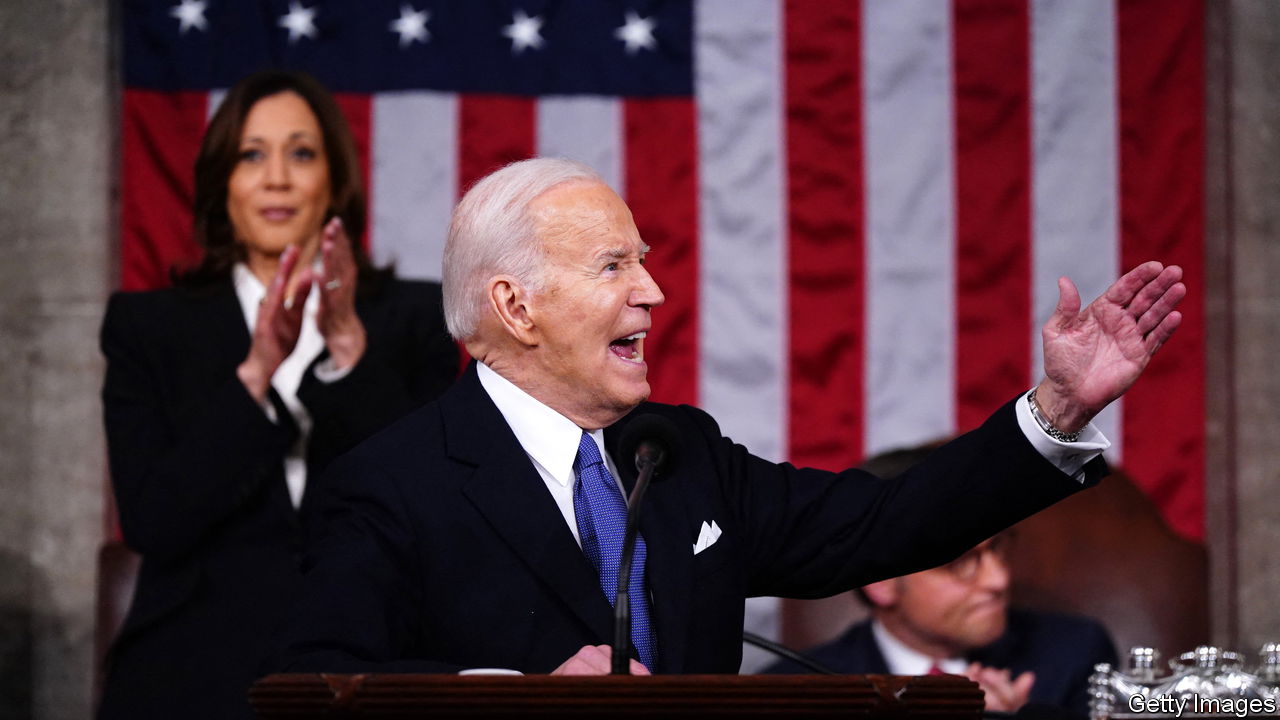When President Joe Biden approaches a lectern, the challenge he confronts is not high expectations. It is instead high anxiety within his own party about his capacity, at 81, to lead, and even to make a compelling case for his presidency. On March 7th he took a step towards dispelling such doubts with a forceful state-of-the-union address in which he extolled his achievements, demanded action from congressional Republicans to secure the border and make taxation fairer, and repeatedly attacked Donald Trump, the presumptive Republican nominee, whom he referred to never by name but as “my predecessor”.
It was a campaign-style speech out of keeping with the tradition of the annual address to both chambers of Congress. Mr Biden not only attacked his opponent but goaded Republicans in the chamber and scolded the justices of the Supreme Court, who sat before him, for their decision to overturn Roe v Wade. Coming from this president, an institutionalist who reveres such traditions, that in itself was a signal that he recognises Mr Trump has shifted American politics onto new terrain, and that Mr Biden intends to take the fight to him there.
Mr Biden directly tackled concerns about his age as he drew to a close after more than an hour. He noted that when he was first elected to the Senate in 1972 he was sometimes barred from Senate lifts because he was thought to be too young to be serving. Now, he continued, “I’ve been told I’m too old.” He smiled the confident smile familiar from his many campaigns, though less seen lately, then said the important question was not the age of the candidates but of their ideas. “Hate, anger, revenge and retribution are the oldest of ideas,” Mr Biden said, referring to qualities Mr Trump has embraced. “But you can’t lead America with old ideas.”
A survey conducted by the Wall Street Journal late last month found that 73% of Americans thought Mr Biden was too old to run for re-election, while 52% felt that way about Mr Trump, who is 77. (For Mr Biden that number was the same last August, but for Mr Trump it has ticked up by five points.) Though both candidates are unpopular, Mr Biden is leading the unpopularity contest. He trails Mr Trump narrowly in national polls, according to The Economist’s poll tracker, but Mr Trump has opened leads in key swing states and, more dangerously, has the confidence of more Americans when it comes to issues they consider critical, such as handling the economy and securing the border.
Mr Biden squinted at the teleprompter as he read his speech, and he swallowed some syllables and occasionally whole words. But he showed himself to be in command of his material and the chamber by baiting Republicans into jeering, then, like a boy relishing a playground scuffle, grinning and punching back. “Yeah, yeah,” he sneered, as Republicans booed his description of the bipartisan Senate border-security bill that the House speaker, Mike Johnson, has refused to bring to a vote. “Look at the facts. I know you know how to read.”
As Mr Biden rattled off the enforcement provisions of the bill, James Lankford, the conservative Republican senator who helped negotiate it for months only to see his party desert it, nodded his head and appeared to mouth, “That’s true.” Mr Biden accused Mr Trump of blocking the bill to help his electoral prospects, then challenged him: “Join me in telling Congress to pass it. We can do it together.”
Mr Biden opened his speech by saying his ambition was to “wake up the Congress” and alert the American people to threats facing the country. In a hopeful sign for aid to Ukraine that is now stalled in Congress, Mr Johnson, seated over Mr Biden’s left shoulder, nodded somberly as the president warned of Russia’s president, Vladimir Putin: “If anybody in this room thinks Putin will stop with Ukraine, I assure you he will not.” Mr Biden invoked Ronald Reagan’s demand that the leader of the Soviet Union tear down the Berlin Wall, adroitly drawing applause from Republicans even as he pivoted to his first, sudden strike at Mr Trump: “Now my predecessor, a former Republican president, tells Putin, quote, do whatever the hell you want!”
Mr Biden connected the threat to democracy in Europe to the attack on the Capitol on January 6th 2021, and said “my predecessor and some of you here seek to bury the truth” about the day. “Here’s the simple truth,” Mr Biden continued. “You can’t love your country only when you win.”
Mr Biden later turned to what he called the “gut-wrenching” violence in the Middle East. He insisted that Israel had the right to pursue Hamas, but also that it had a “fundamental responsibility” to protect civilian lives, and he gave a harrowing account of the suffering of Gazans. He said America would erect a temporary pier on Gaza’s shore and begin supplying aid by sea, and that Israel had also committed to opening a crossing into the Gaza Strip from the north.
These efforts might not mollify Democratic progressives angry at Mr Biden for his support of Israel. But Democrats in the chamber were thrilled with the pugilistic, populist tenor and substance of his speech. For the most part he avoided high-flown oratory in favour of simpler formulations as he demanded that Congress act to lower drug prices and housing costs. “Folks at home,” he shouted at one point, “does anyone really think the tax code is fair?” “No!” shouted the Democrats in the chamber, and Mr Biden promised to “keep fighting like hell to make it fair”. ■

 Accounting1 week ago
Accounting1 week ago
 Economics1 week ago
Economics1 week ago
 Personal Finance1 week ago
Personal Finance1 week ago
 Accounting1 week ago
Accounting1 week ago
 Finance1 week ago
Finance1 week ago
 Economics1 week ago
Economics1 week ago
 Economics1 week ago
Economics1 week ago
 Economics1 week ago
Economics1 week ago






















